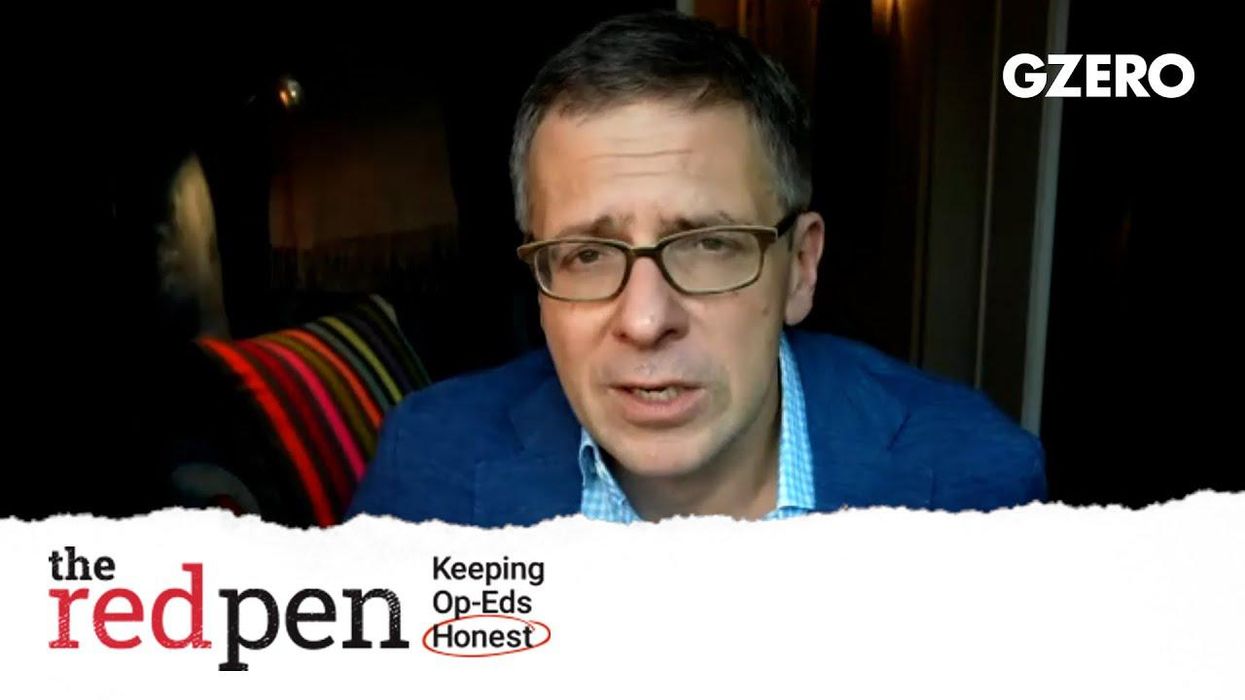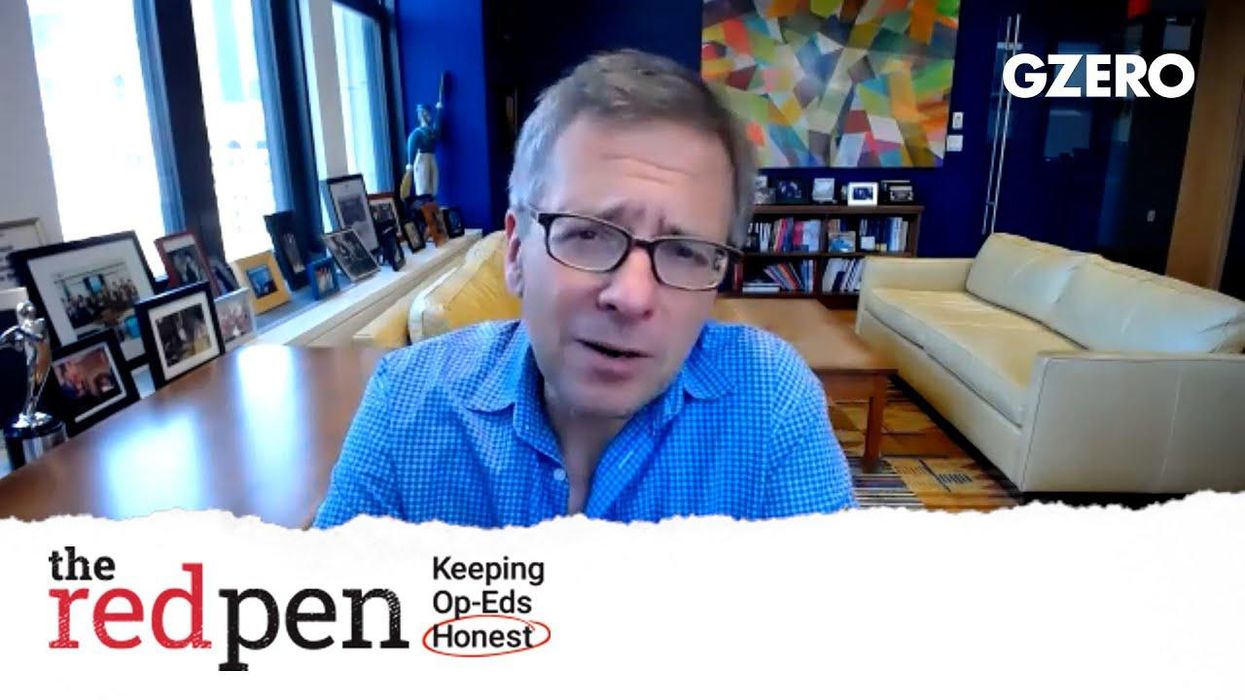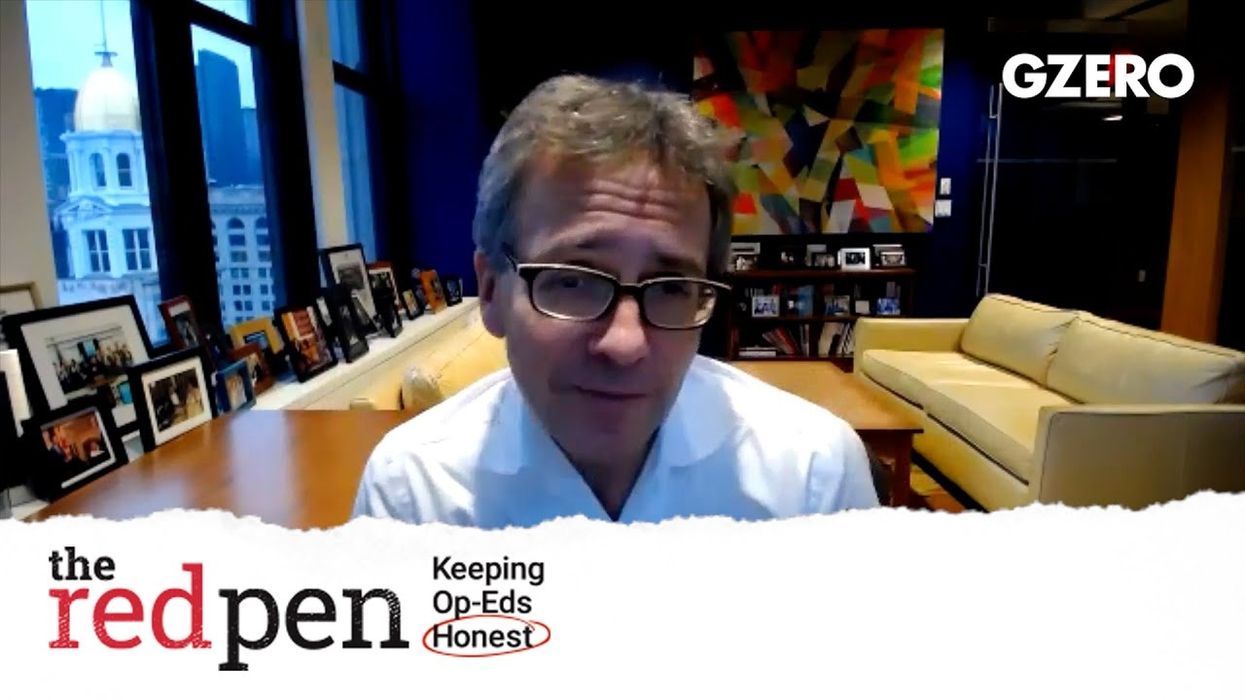VIDEOSGZERO World with Ian BremmerQuick TakePUPPET REGIMEIan ExplainsGZERO ReportsAsk IanGlobal Stage
Site Navigation
Search
Human content,
AI powered search.
Latest Stories
Sign up for GZERO Daily.
Get our latest updates and insights delivered to your inbox.
Global Stage: Live from Davos
WATCH
The Red Pen
On GZERO Media's series The Red Pen, Ian Bremmer and colleagues pick apart the argument in a major opinion piece.
Presented by
In a Washington Post op-ed, commentator Hugh Hewitt states his concern that President Biden will continue his streak of policy reversals in the Middle East, specifically regarding the peace deals that Trump brokered in his final year in office. But in fact, Biden has consistently supported the Abraham Accords, even during the heat of the presidential campaign. Ian Bremmer and Eurasia Group analysts Jeffrey Wright and Sofia Meranto take out the Red Pen to point out that Hewitt may be overreacting to Biden's recent freeze on a fighter jet deal to the UAE.
We're taking our Red Pen to an op-ed from the Washington Post, written by well-known radio host and columnist Hugh Hewitt. It's titled, "The Biden Administration could derail the Abraham Accords. It mustn't."
Hewitt is arguing that one of the most important foreign policy accomplishments of the Trump presidency, no question there, the normalization of diplomatic relations between Israel and the UAE, Bahrain, Sudan and Morocco should not be unraveled by President Biden and his foreign policy team.
Now in fairness, President Biden has spent the bulk of his first few weeks in office undoing many of Trump's policy decisions. Rejoining the Paris Climate Accord for example, and the World Health Organization, ending the Muslim ban, reversing the ban on transgender people joining the military, to name just a few. But does that mean the Abraham Accords are kaput? Not a chance. Let's get out the red pen.
Hewitt hangs the bulk of his evidence on a specific aspect of the deal with the UAE involving the sale of US fighter jets to the Gulf nation. The Biden administration has halted that sale for the moment. And Hewitt writes, "With the announcement last week that the new administration will review a sale of a batch of fighter jets to the UAE, one of the most important diplomatic achievements could be in question."
That's a really big leap. To be clear, we're talking about one specific aspect of the deal, for starters, not the whole enchilada. Let's look at the context. It's not actually unusual for a new administration, either Democrat or Republican, to press pause on arms sales initiated by the previous one. It happens frequently, and those deals usually tend to get approved and eventually move forward. Further, the UAE doesn't seem all too worried. Its US Embassy, which had fantastically close relations with Jared Kushner in the Trump administration, tweeted that the pause was expected, and the nation is looking forward to working with the Biden administration.
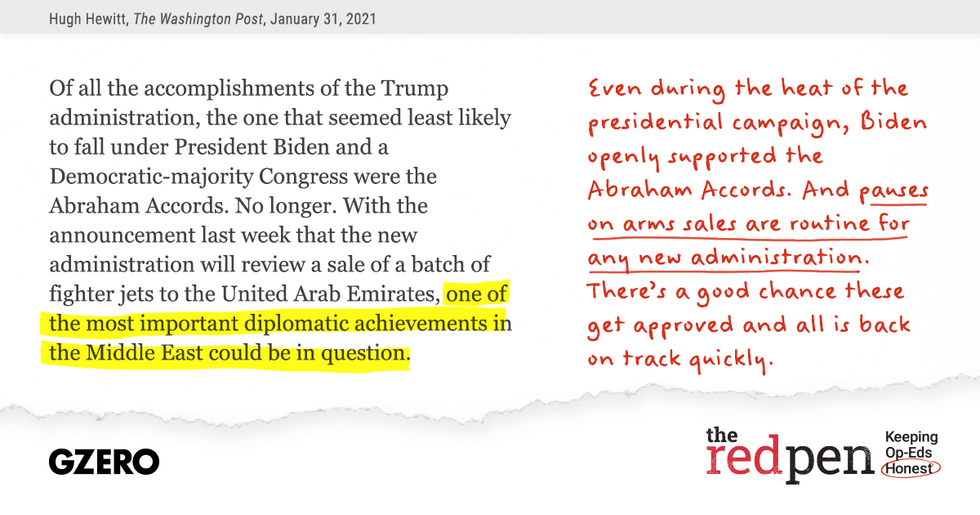
Next, Hewitt argues that the fighter jets are "the crucial glue holding together US interests in the regions" and that the Abraham Accords could unravel without them. The Accord was important because it recognized the reality that Israel and the Gulf States had actually built a productive and quiet relationship, something frankly not appreciated under the previous Obama-Biden administration. The Trump deal didn't actually create that relationship, though it certainly did help it along. Remember, Trumps first trip as president was actually to Saudi Arabia and Israel, very unusual. And the UAE is not about to throw away its relationship with Israel, which it finds strategically very important, much less with the United States it's critical ally, even if the fighter jet sale were to go south. Which again, we don't expect.
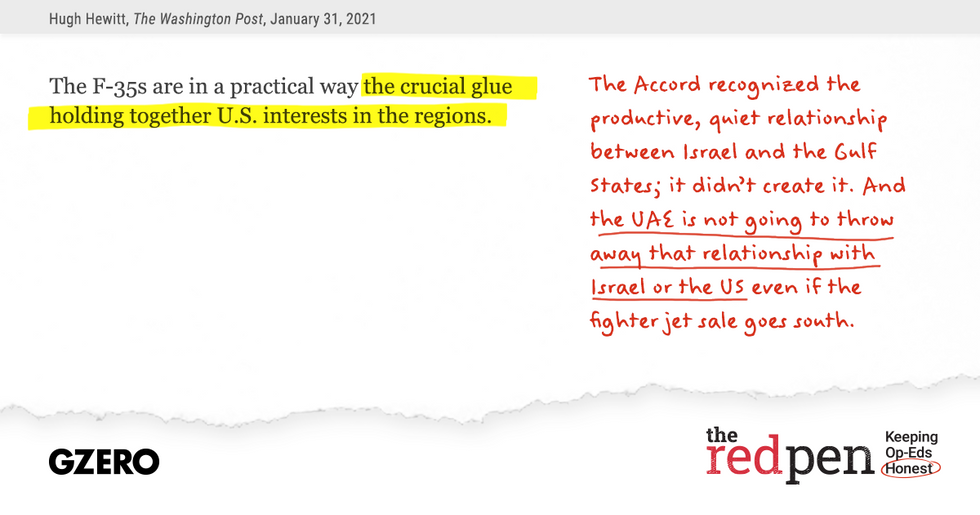
Hewitt also writes, "The Iranians are not happy that the UAE may prove to be our wingman in any future conflict with the mullahs in Tehran." Well, to be fair, the UAE didn't actually sign up to be a "wingman." The US and UAE have differing views about the threat that's posed by Iran. And the Iranians are more concerned about the political alignment against them than they are more fighter jets in the region.
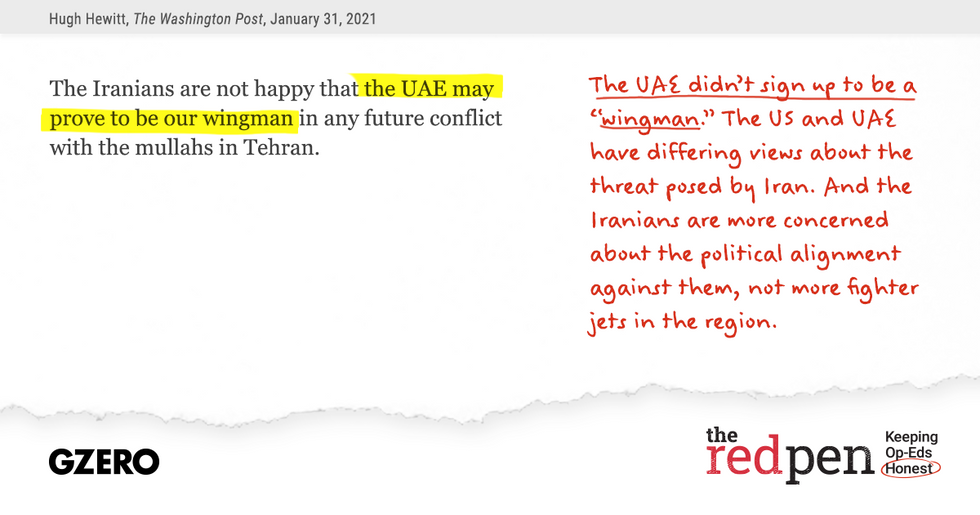
And finally, if you want to have a better sense of where the Biden Administration is heading on this issue, all you have to do is look at what they've already publicly said. During his Senate confirmation hearing, Secretary of State Tony Blinken said the US would keep its embassy in Jerusalem. And National Security Advisor Jake Sullivan described the Abraham Accords as "positive" for both security and the economy in the Middle East. Two big Trump accomplishments that the Biden team is absolutely signed up for. And keep in mind that even at the height of an incredibly heated presidential campaign, Joe Biden himself never denounced the deal. In fact, he actually openly supported it.
So, a great undoing really isn't in the works, at least when it comes to the Abraham Accords. We can expect a different approach to a lot of things in the Middle East from the Biden Administration, in terms of the Iranian Nuclear deal for example, no question. Also, restoring aid to and diplomacy with Palestinians who were not directly engaged in the Trump deal.
But a 180 on the Abraham Accords, that's not happening.
So, that's your Red Pen for this week. Stay safe, stay warm, and watch the Super Bowl, but be sure to avoid people. Talk to you soon.
Keep reading...Show less
More from The Red Pen
Fix climate change, don't just adapt to its consequences
November 05, 2021
Biden's mistakes in Afghanistan were not "dereliction of duty"
September 02, 2021
US global power remains strong, despite Afghanistan mistakes
August 25, 2021
Would China really invade Taiwan?
May 06, 2021
Mitt Romney isn't the future of the GOP. He's the past.
February 12, 2021
China's EU deal betrays insecurity; not a wedge between US & EU
January 07, 2021
America is still a democracy post-Trump, but is it a healthy one?
December 11, 2020
Don’t "give up" on all 73 million Americans who voted for Trump
November 20, 2020
The GOP siding with Trump is hardly a threat to democracy
November 12, 2020
"Fixing" US foreign policy isn't the real challenge Biden would face
October 16, 2020
Calling AMLO authoritarian is a gross exaggeration
October 08, 2020
The US COVID response under Trump was not "merely mediocre"
September 09, 2020
US-Russia: An all-or-nothing approach leaves US with nothing
August 14, 2020
The recovery will be a jagged swoosh, not a V-shape
July 10, 2020
Criticisms of US COVID response vs EU are not partisan
July 01, 2020
Hong Kong is a tragedy, not a domino
June 03, 2020
No, don’t abolish the WTO. Reform it.
May 07, 2020
Ian Bremmer: The United States isn't Sweden
April 30, 2020
GZERO Series
GZERO Daily: our free newsletter about global politics
Keep up with what’s going on around the world - and why it matters.

